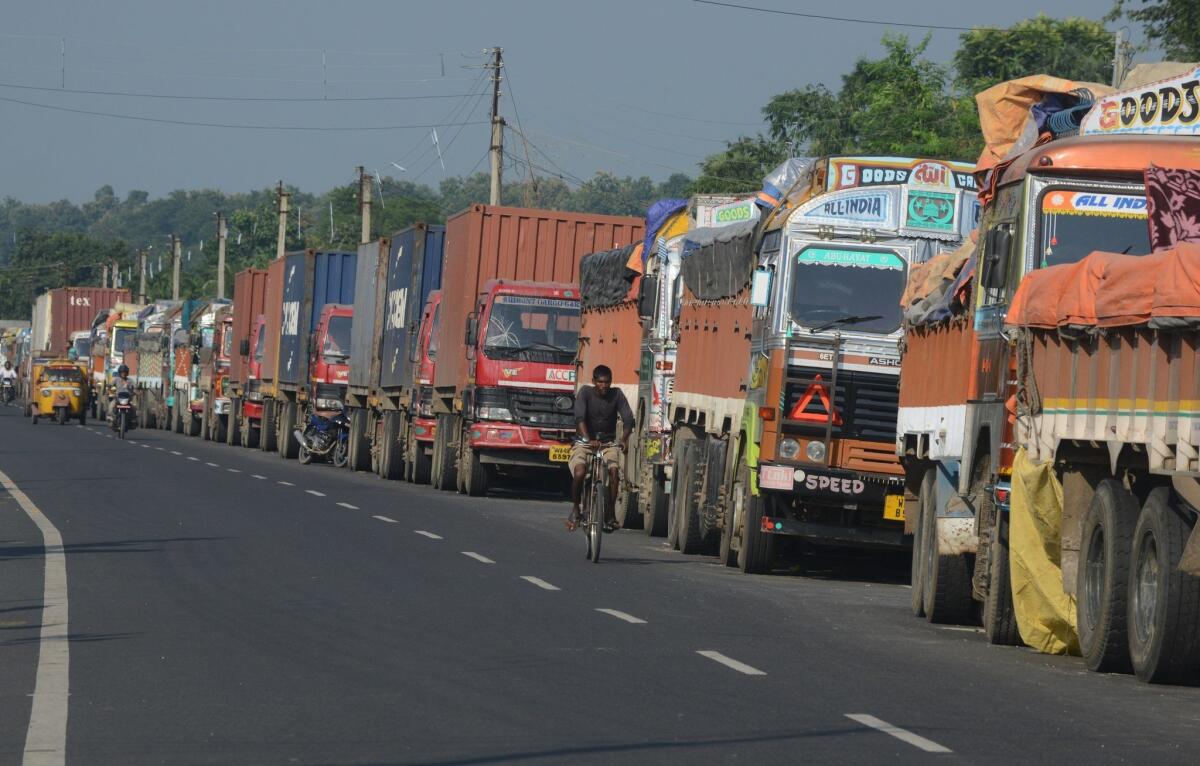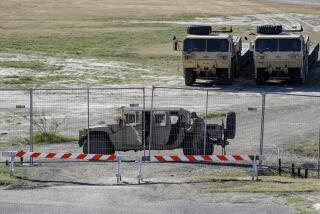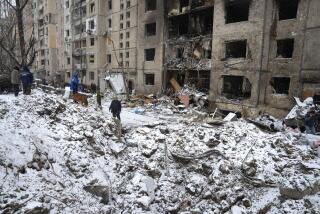Trouble near top of the world: Protests strain ties between Nepal, India

An Indian man cycles past parked Indian trucks carrying goods to Nepal near the India-Nepal border at Panitanki on Tuesday.
- Share via
reporting from Katmandu, Nepal — The passage of a long-awaited constitution in Nepal should have been a happy moment for a country still picking up the pieces from a devastating earthquake in April.
Instead, the new charter has prompted protests that have shut down local governments and drawn the ire of India, Nepal’s powerful neighbor. Nepalese officials said Tuesday that a de facto blockade of its land border with India had stretched into a sixth consecutive day, prompting fuel rationing and accusations that New Delhi was interfering in Nepalese affairs.
The blockage at a key border crossing 85 miles south of Katmandu comes after India issued a terse statement widely interpreted as a rebuke to Nepal’s constitution. The charter is opposed by Nepalese living along the southern border with India, who say it reduces their political representation.
India has denied imposing a blockade, saying that trucks are not crossing into Nepal due to security fears surrounding the protests. Local officials in Raxaul, the Indian border town that transmits more than half of the goods traded between the countries, said a line of trucks waiting to cross the border now stretches for several miles.
“Although we’ve been coordinating with the customs office in India, they are unable to send cargo trucks across, citing the protest at the border checkpoints,” said Sushil Sharma, information officer at the Nepalese customs office in Birgunj, across the border from Raxaul.
Landlocked Nepal relies heavily on the border crossing and the Indian port at Kolkata for its trade. More than 700 trucks crossed the border checkpoint in Birgunj daily before the protests escalated six days ago, Sharma said.
The Nepalese government ordered fuel rationing on Monday, citing shortages due to the border strife. Since last Wednesday, officials said, only a handful of tankers carrying fuel and vegetables had entered Nepal, down from some 200 fuel tankers that would arrive on a normal day.
Authorities at Tribhuvan International Airport in Katmandu said they would no longer be able to supply jet fuel to commercial airliners beginning Tuesday afternoon.
“The decision was taken because of the depleting fuel stock,” said Devanand Upadhyay, the airport’s general manager. “Unless the supply eases here, international carriers have been asked to refuel on their way to Nepal.”
Last week, hundreds of demonstrators blocked a bridge linking Birgunj with the Indian side. Although protests have subsided, clashes between security forces and anti-constitution groups have killed more than 40 people in recent weeks and forced the shutdown of dozens of district governments.
Nepal’s fractious political parties, which had missed multiple deadlines to draft a new constitution since 2006, finally seemed spurred to action by the April 25 earthquake that left nearly 9,000 people dead.
But groups in the Terai — the southern plains whose people share cultural and economic ties to India – are demanding changes to the document, saying it reduces their political representation and further boosts highland ethnic groups that have long held sway over Nepal’s politics.
The Nepalese government said Tuesday it had formed a three-member team to initiate talks with the protesters.
India has long regarded its northern neighbor as something of a kid brother. Indian officials had expressed concerns about the protests in the border areas before the constitution was adopted and urged their Nepalese counterparts to take a more inclusive approach, officials say.
The Indian Embassy in Nepal issued a statement saying Indian traders feared for their safety in Nepal and were afraid their trucks would be looted by protesters if not escorted by security guards. New Delhi has steadfastly denied imposing a blockade.
“There is no issue from our side. The transport will be smooth once the situation in Nepal calms down,” Jitender Rana, superintendent of police in India’s Motihari district, which includes Raxaul, said by phone. “Nobody wants to get stuck in Nepal in a situation like that.”
The diplomatic standoff had few sympathizers in Katmandu, where the number of vehicles plying the streets has dwindled significantly and the lines at gas stations are getting longer each day.
“It’s been six hours already and I am still only halfway through this snaking queue,” said Rajesh Kumar Jaiswal, who was trying to buy less than a gallon of gas for his motorcycle.
“Where do I even start? There are just so many problems at the moment. I don’t know when this uncertainty will end.”
Special correspondents Rai reported from Katmandu and Parth M.N. from Mumbai, India. Time staff writer Shashank Bengali in Ootacamund, India contributed to this report.
Follow @SBengali on Twitter for news out of South Asia
More to Read
Sign up for Essential California
The most important California stories and recommendations in your inbox every morning.
You may occasionally receive promotional content from the Los Angeles Times.










